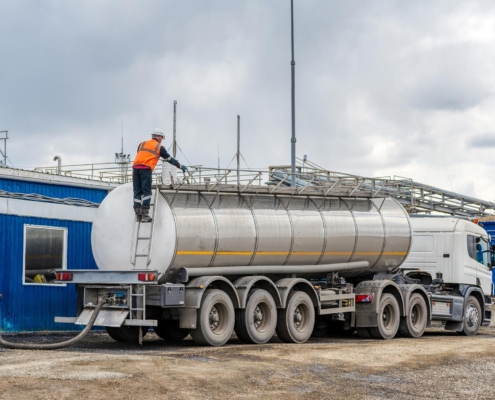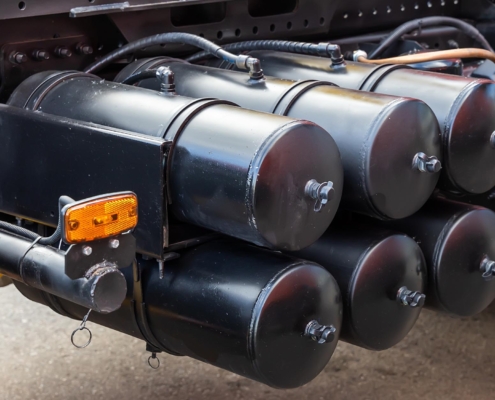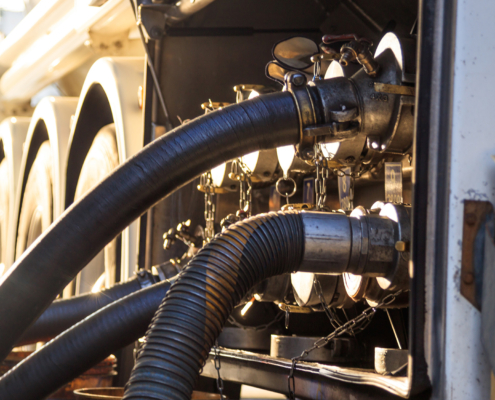
Meter Provers
Interested in buying a meter prover from White Tank & Truck Repair? Here’s everything you need to know.
What Is a Meter Prover?
White Tanks’ meter provers are essential tools for assessing flow meters’ precision, particularly in custody transfer measurement systems. The primary objective of these systems is to guarantee the accurate transfer of product quantities between two entities. Meter provers test positive and negative displacement meters, turbine and ultrasonic flow meters, and more. Below we will cover our mechanics of meter proving and its pivotal role in enhancing the accuracy of flow measurements.
How Do Meter Provers Work?
Our meter provers are vital components that employ a chamber with a known volume to “prove” the accuracy of flow meters. By measuring the liquid entering or exiting, the device compares this quantity to the chamber’s established volume, enabling the calculation of an accuracy percentage. Testing new and existing units is particularly beneficial for calibrating flow meters in challenging-to-access areas or where regular maintenance is impractical. The consistent use of meter provers can maintain the longevity of accurate flow measurements.
Compatibility with the targeted meter type is crucial when selecting a meter prover. Some are tailored for specific flow meter types, while others accommodate a range of variations. Although meter provers often possess a considerable footprint, certain manufacturers offer “portable” alternatives engineered for effortless transport and installation. These devices are an ideal solution for organizations requiring meter testing across multiple locations.
Why Are Meter Provers Important?
Meter proving plays a crucial role in verifying the precision of flow measurements, which often outweighs the cost of the meter prover itself. They serve as a diagnostic tool for checking performance and identifying potential issues within your flow measurement system.
Our meter proving also helps businesses prevent potential legal complications. In numerous countries, regulatory requirements mandate consistent proof of accuracy for custody transfer flow meters. Neglecting this obligation can lead to substantial fines and penalties, making meter provers an indispensable part of ensuring the precision of your measurement system.
Advanced Diagnostics at White Tank & Truck Repair
White Tank & Truck Repair understands the importance of accurate flow measurements and the role played by meter provers. Our team of highly skilled technicians utilizes advanced diagnostics to ensure the highest standards of accuracy and reliability.
Comprehensive Testing
White Tank & Truck Repair’s diagnostics encompass thorough testing of meter provers. Our experts meticulously track liquid flow into or out of the provers’ chambers and compare the results against the known chamber volume. We determine the accuracy percentage through precise calculations, enabling businesses to have complete confidence in their measurements.
Fault Identification
In cases where flow meter issues are suspected, White Tank & Truck Repair’s diagnostics come to the rescue. By utilizing our expertise and cutting-edge equipment, we can identify potential problems that may be affecting the meter’s accuracy. From mechanical faults to electronic malfunctions, White Tank’s technicians are adept at determining and rectifying issues promptly.
Seamless Replacement
White Tank & Truck Repair ensures a seamless transition when meter provers need replacement. Our professional team draws on extensive experience to minimize disruption to your operations. We select provers compatible with the specific flow meter types, guaranteeing optimal functionality and accuracy.
Having the right proving meter is important, but having diagnostics to improve system performance is critical. White Tank & Truck Repair has just the services for your operation.
How to Find the Right Meter Prover
Choosing the right meter prover ensures accurate flow measurements and efficient operations. With a wide range of options available, White Tank & Truck Repair has the perfect tool for you.
Positive Displacement Meters
Our meters operate by trapping and measuring discrete volumes of liquid, making them highly accurate for low-flow applications. With our expertise, we can guide businesses in selecting a meter prover designed explicitly for positive displacement. By considering factors such as chamber size, displacement method, and calibration capabilities, White Tank & Truck Repair ensures compatibility and optimal performance.
Turbine Flow Meters
Turbine flow meters are commonly used in industries with high flow rates. They utilize rotating blades or propellers to measure fluid velocity. Selecting a meter prover for turbine flow meters requires consideration of factors such as flow range, material compatibility, and calibration methods. White Tank & Truck Repair’s knowledgeable technicians can assist in choosing the ideal model, ensuring precise measurements and long-term reliability.
Stationary Meters
For businesses that require permanent metering solutions, stationary meters are the preferred choice. White Tank & Truck Repair understands their specific requirements and can help companies to select a meter prover that complements their infrastructure. Considering chamber size, installation ease, and maintenance requirements ensures seamless integration and accurate measurements.
Portable Meters
White Tank & Truck Repair recognizes the importance of portable meters in certain industries and can assist businesses in choosing a suitable meter prover. By considering factors such as portability, durability, and ease of use, we help your operation maintain accuracy and reliability even in dynamic environments.
White Tank & Truck Repair: Our Meters Matter
When it comes to choosing the right meter prover, White Tank & Truck Repair is here to help. We offer a wide variety, from unidirectional meter provers to standard offerings. Our team can help you choose the right device for your needs. We also offer calibration services to ensure your meter prover is working correctly. Contact our team to get started today.





